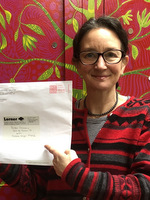
Rachel Ginocchio, a 2000 Health Services Master of Public Health (MPH) alum, began her career in sexuality education in 1992, working four hours a week for $6.15 per hour at Planned Parenthood. After four years and a series of promotions, she became clinic director. Back then, sex education in school was focused largely on anatomy, pregnancy prevention, and sexually transmitted infection (STI) transmission.
Over the past 25 years, a lot has changed in the way that American culture approaches sex education. The gold standard for sex education has expanded to become what we now call comprehensive sexuality education.
Comprehensive sexuality education goes beyond anatomy and reproduction to include topics like gender identity and expression, relationships, pleasure, sexual orientation, body positivity, boundaries, and consent. It also explores how values, race/ethnicity, class, and religion all impact our sexual health decisions and outcomes.
However, even within comprehensive sexuality education, the discussion around human reproduction has not kept pace with the times.
“Sex education looks totally different than when I first entered the field, except when it comes to the topic of reproduction,” Ginocchio said. “Educators are still teaching the same concepts in the same way that they always have. The heteronormative narrative that all babies are a result of penis-vagina sexual intercourse is not only factually inaccurate, it is also stigmatizing. Advances in science and medicine have enabled us to make babies and create families in all sorts of different ways with the help of donors, surrogates, insemination, and IVF.”

Failing to address the complexities of human reproduction is detrimental to youth, and to society as a whole. “When educators rely on these outmoded, overly simplistic explanations, we are telling millions of kids that their own story of origin doesn’t count, and that the family structures of their friends and classmates, and the families they see in the media, are not worth understanding,” Ginocchio said. “Youth are growing up without the vocabulary to talk respectfully about the families they encounter in their daily lives, and teachers don’t have the skills to be inclusive in their classrooms.” These gaps in education can be especially detrimental for LGBTQAI+ youth, and those with certain medical conditions, who might rely upon knowledge of assisted reproduction methods — such as IVF, egg or sperm donation, and surrogacy — to start their own families, in the future.
Ginocchio’s goal is to help youth educators provide inclusive sexual education about all the ways that humans reproduce and create family. In pursuit of this aim, Ginocchio has signed a book deal with Lerner Publishing to write a middle-grade book for 10- to 14-year-olds, which will weave the science of reproduction into the journeys of families with a variety of family structures and experiences.
In her decades of experience, Ginocchio has served as a health communications specialist for the American Sexual Health Association, directed two reproductive health clinics in Portland, and co-developed a five-year strategic plan for genetics in Oregon for the Oregon Health Authority. In 2018, RGinocchio founded her own organization, Roads to Family, which offers sex education and consulting services, including a neighborhood workshop for teens and guardians called “Pizza and Puberty,” and a learning series for adults called “Brains and Brews: learning and growing together and becoming much wiser parents.” Across her professional endeavors, Ginocchio enjoys speaking, teaching and writing for people of all ages, about an inclusive version of human reproduction; she recently presented on this topic at the National Healthy Teen Network Conference.
Ginocchio has also been co-awarded a grant to write a curriculum for the Oregon Department of Education that includes equal discussion of all means of human reproduction and family formation. In this work, she has partnered with Gaye Chapman, an LGBTQAI+ inclusive sexual health educator in Portland, Oregon; the Oregon chapter of GLSEN; and Advocates for Youth, a nonprofit organization focused on healthy sex education. “The curriculum will be available to educators who are interested in exploring an age-old topic in a novel way,” Ginocchio said.
Ginocchio applies her MPH training daily in her work. “There isn’t a work activity where I can’t incorporate the ten essential services of public health, along with the socioecological model of health promotion,” she said. “Whenever I am facilitating a conversation, administering a program, or outlining components of a project, I run through them as a checklist.”